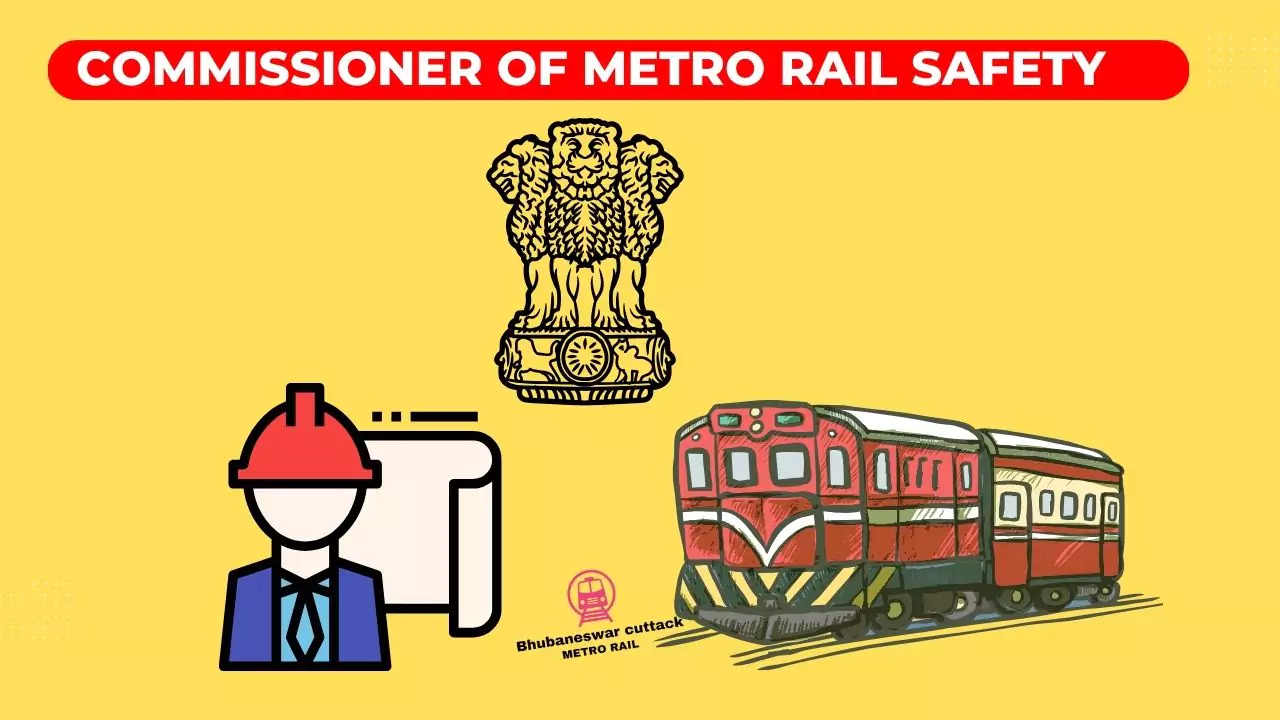What Is Commissioner of Metro Rail Safety?
The Commissioner of Metro Rail Safety stands as a pivotal figure in ensuring the security and reliability of metro rail systems across India.
Tasked with a myriad of responsibilities and wielding significant authority, this role plays a vital part in upholding safety standards, conducting inspections, and overseeing regulatory compliance within the expansive metro rail network.
From defining its role and jurisdiction to unraveling the appointment process and the intricate web of collaborations, this article aims to provide a comprehensive insight into the multifaceted realm of the Commissioner of Metro Rail Safety in India.
Role and Responsibilities of the Commissioner:
The Commissioner of Metro Rail Safety assumes a pivotal role in ensuring the robustness and safety of the burgeoning metro rail infrastructure in India. Tasked with overseeing safety measures and compliance, their responsibilities encompass a broad spectrum of critical functions within the realm of metro rail operations.
Ensuring Safety Standards: At the core of their duties lies the meticulous oversight of safety standards. The Commissioner is entrusted with setting and upholding stringent safety protocols to safeguard commuters, rail personnel, and surrounding communities. This responsibility extends from the initial construction phases to the ongoing operations of the metro rail systems.
Conducting Inspections: Regular and thorough inspections stand as a cornerstone of the Commissioner’s tasks. They lead teams of experts in conducting comprehensive inspections of rail infrastructure, stations, signaling systems, tracks, and rolling stock. These meticulous examinations help identify potential risks and ensure compliance with safety regulations.
Approving New Projects: Before the launch of any new metro rail project, the Commissioner’s office rigorously evaluates the safety aspects. This involves scrutinizing design blueprints, technical specifications, and proposed safety measures to grant approval for commencement.
Investigating Incidents: In the unfortunate event of accidents or safety breaches, the Commissioner’s office leads in-depth investigations. Their role is to determine the causes, analyze contributing factors, and recommend corrective actions to prevent future occurrences.
Educating and Advising: Apart from regulatory oversight, the Commissioner also plays a role in educating stakeholders about safety standards and best practices. They offer guidance and advice to metro rail authorities, operators, and stakeholders to enhance safety measures and mitigate risks.
Public Engagement: Engaging with the public forms an integral part of the Commissioner’s responsibilities. They often communicate safety guidelines, updates, and awareness campaigns to keep commuters informed about safety practices and improvements in the metro rail system.
In essence, the Commissioner of Metro Rail Safety embodies a critical position, ensuring that safety remains paramount in the evolution and operation of India’s extensive metro rail networks.

Who appoints the Commissioner of Metro Rail Safety?
The appointment of the Commissioner of Railway Safety is vested with the Government of India, specifically the Ministry of Civil Aviation. This significant designation is not achieved through direct election or an internal promotion within the railway system but through a meticulous selection process governed by established norms and qualifications.
Appointment Process:
Nomination and Selection: The Ministry of Civil Aviation typically initiates the appointment process by inviting applications or nominations from distinguished individuals possessing substantial experience in railway operations, safety management, engineering, or other related fields. The candidates undergo rigorous scrutiny based on their expertise, qualifications, and demonstrated commitment to safety.
Jurisdiction of the Commissioner of Metro Rail Safety:
The Commissioner of Metro Rail Safety wields a significant jurisdictional reach across the diverse landscape of India’s metro rail networks. Empowered with overseeing safety measures, their jurisdiction spans across various facets of metro rail operations, ensuring adherence to safety standards and regulatory compliance.
Geographical Coverage: The Commissioner’s jurisdiction extends throughout the geographical expanse where metro rail networks operate. This includes major metropolitan cities and their surrounding areas where metro rail systems are established or under construction.
Multi-Dimensional Oversight: The Commissioner’s oversight encompasses a myriad of elements within the metro rail infrastructure. From inspecting tracks, stations, and tunnels, to scrutinizing rolling stock, signaling systems, and operational protocols, their jurisdiction ensures a comprehensive approach to safety.
Project Approval and Expansion: Before the inception of new metro rail projects or expansions, the Commissioner’s office plays a crucial role. They meticulously review proposed plans, technical specifications, and safety measures, ensuring that these initiatives adhere to stringent safety protocols before granting approval.
Collaborative Endeavors: While holding a significant individual jurisdiction, the Commissioner often collaborates with various stakeholders. This includes metro rail authorities, construction companies, regulatory bodies, and local administrations to ensure a unified approach to safety measures and standards.
Adherence to Legal Frameworks: Within their jurisdiction, the Commissioner ensures strict adherence to established legal frameworks and safety regulations. This involves interpreting and implementing safety laws, codes, and guidelines that govern metro rail operations in India.
Continuous Monitoring and Evaluation: Beyond initial approvals, the Commissioner’s oversight remains continual. They engage in periodic monitoring and evaluation of existing metro rail systems to ensure sustained compliance with safety standards and to identify areas for improvement.
In essence, the Commissioner’s jurisdiction spans a wide spectrum, encompassing both geographical and operational dimensions, ensuring that safety remains a paramount consideration in every aspect of India’s evolving metro rail networks.
Commissioner of Metro Rail Safety Inspections and Regulations:
Safety inspections stand as the cornerstone of the Commissioner’s efforts to maintain and enhance safety within India’s metro rail networks. Through rigorous inspections and adherence to stringent regulations, the Commissioner ensures that every aspect of metro rail operations complies with established safety standards.
Comprehensive Inspections: The Commissioner’s office conducts regular and comprehensive inspections across all facets of metro rail operations. This includes meticulously examining tracks, signaling systems, rolling stock, stations, and auxiliary infrastructure to identify potential safety hazards or deviations from safety standards.
Regulatory Compliance: In addition to conducting inspections, the Commissioner ensures strict compliance with an array of safety regulations. These regulations encompass a wide spectrum, covering technical specifications, operational procedures, emergency protocols, and structural integrity to guarantee a safe commuting experience for passengers and railway staff alike.
Risk Assessment and Mitigation: The Commissioner’s team employs robust risk assessment methodologies during inspections. Identifying potential risks and vulnerabilities allows for prompt mitigation measures to be implemented, thus preempting potential safety hazards and ensuring a secure metro rail environment.
Periodic Reviews and Audits: Regular audits and reviews form an integral part of the safety regimen overseen by the Commissioner. These periodic assessments serve as checkpoints to evaluate the efficacy of safety measures, identify evolving safety needs, and implement necessary upgrades or modifications to enhance safety standards.
Adaptation to Technological Advancements: With the rapid evolution of technology in the railway sector, the Commissioner stays abreast of technological advancements. This involves assessing the compatibility of new technologies with established safety standards and integrating them seamlessly into the existing safety framework.

Collaborations and Authorities Commissioner of Metro Rail Safety:
Collaborative Endeavors: While holding a significant individual jurisdiction, the Commissioner often collaborates with various stakeholders. This includes metro rail authorities, construction companies, regulatory bodies, and local administrations to ensure a unified approach to safety measures and standards.
Adherence to Legal Frameworks: Within their jurisdiction, the Commissioner ensures strict adherence to established legal frameworks and safety regulations. This involves interpreting and implementing safety laws, codes, and guidelines that govern metro rail operations in India.
Continuous Monitoring and Evaluation: Beyond initial approvals, the Commissioner’s oversight remains continual. They engage in periodic monitoring and evaluation of existing metro rail systems to ensure sustained compliance with safety standards and to identify areas for improvement.
How many Commissioners are there in railway safety in India?
In India, the Railway Safety Commission is typically headed by a Chief Commissioner of Railway Safety (CCRS). There might be multiple Commissioners depending on the workload and specific divisions, but the overall authority is vested in the Chief Commissioner.
Where is the headquarters of the Chief Commissioner of Railway Safety?
The headquarters of the Chief Commissioner of Railway Safety in India is located in New Delhi.

